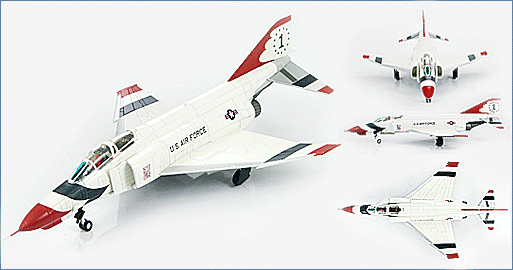Air Power Series>1:72 die-cast display model>F-4>HA1910
McDonnell Douglas F-4E Phantom II U.S. Air Force "Thunderbird 1"

General Background
The F-4 Phantom II first entered US Military service in 1960. It was designed as a fleet defense fighter for the US Navy but by 1963 it was adopted as the US Air Force primary fighter-bomber.
Despite the size and weight of this Cold War icon the F-4 broke 15 world records and continued to hold five of them until 1975.
Produced from 1960 to 1981 there were 5,195 Phantom IIs manufactured. Eleven countries other than the USA had the Phantom II in their inventory.
Produced from 1960 to 1981 there were 5,195 Phantom IIs manufactured. Eleven countries other than the USA had the Phantom II in their inventory.
The Aircraft
The Thunderbirds were officially activated May 25, 1953, as the 3600th
Air Demonstration Unit at Luke Air Force Base, Ariz. The Korean War was
the first time the U.S. used jet aircraft in combat and the mission of
the 3600th was to show the American public the safety and reliability of
the new technology of the time.
From 1969 to 1973, the Thunderbirds flew the Air Force’s frontline fighter of the time, the F-4E Phantom II. In five seasons, the team performed more than 500 demonstrations while traveling to 30 of the 50 states, Canada, Central America, and Europe.
From 1969 to 1973, the Thunderbirds flew the Air Force’s frontline fighter of the time, the F-4E Phantom II. In five seasons, the team performed more than 500 demonstrations while traveling to 30 of the 50 states, Canada, Central America, and Europe.
Specifications :
| Dimensions | |
| Length: | 17.7m |
| Height: | 4.7m |
| Wingspan: | 11.6m |
| Wingarea: | 49.2 sq m |
| No. of Engines: | 2 |
| Powerplant : | General Electric J79-GE-10 (A/B 17,900Lb/8,119Kg) |
| Performance |
|
| Range: | 2,222 km |
| Cruise Speed: | 908 km/h |
| Max Speed: | 2,299 km/h |
| Climb: | 12,572 m/min |
| Ceiling: | 16,672 m |

